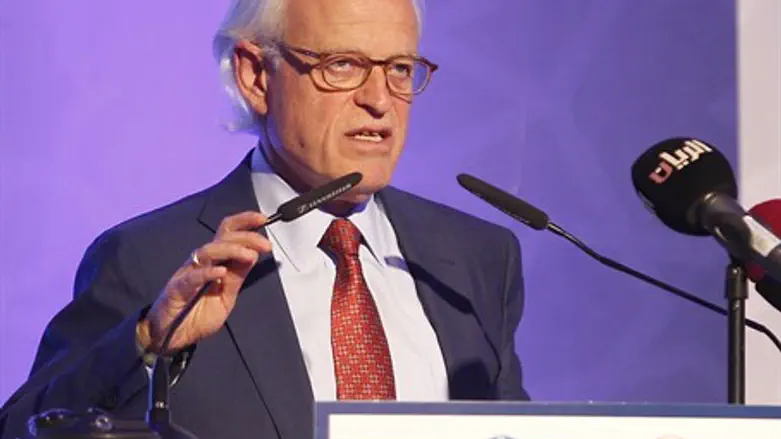
The Israel-Palestinian Authority (PA) peace process is dead, according to Martin Indyk, formerly the U.S. special Middle East envoy who resigned from his post last week.
Speaking to The Atlantic’s Jeffrey Goldberg in his first interview since stepping down, Indyk said that there is strong dislike between Israeli Prime Minister Binyamin Netanyahu and PA Chairman Mahmoud Abbas.
"There is a deep loathing of each leader for the other that has built up over the years," Indyk said in the interview, which was published Thursday.
"'Loathing' may be too strong [a word] for how Netanyahu feels about Abu Mazen (Abbas -ed.)," he later clarified, "but it's certainly the way Abu Mazen feels about Netanyahu. He refers to him as 'that man.'"
Indyk further said that he felt nervous following the latest violence following the murders of three Israeli teens by terrorists.
"I fear the worst here," he told The Atlantic. "What you've got now is ... a more rapidly deteriorating situation in which all of the worst fears and worst assumptions about the other side are being confirmed."
Indyk rejected the notion that the Obama administration frittered away precious diplomatic energy on a long-elusive Mideast peace agreement while Syria and Iraq imploded, arguing that Kerry and others didn't forsake those other regional issues.
According to Indyk, the sides were close to a deal. He told The Atlantic that after six months of direct negotiations between, Netanyahu "moved into the zone of a possible agreement" and was prepared to make substantial concessions.
Beginning in mid-February, however, Abbas suddenly "shut down," according to Indyk. By the time he visited Obama in Washington in March, he "had checked out of the negotiations," repeatedly telling U.S. officials that he would "study" their proposals, Indyk said.
Abbas later signed 15 international conventions and struck a unity deal with Hamas, ultimately leading to Israel’s withdrawal from the talks.
Indyk blamed “Jewish settlement activity” as being responsible for Abbas's about-face, particularly its announcements of new construction.
"The Israeli attitude is that's just planning," he told The Atlantic. "But for the Palestinians, everything that gets planned gets built. ... And the fact that the announcements were made when the prisoners were released created the impression that Abu Mazen had paid for the prisoners by accepting these settlement announcements."
The former envoy said the chasm between the two leaders was most evident in their standoff over Netanyahu's demand that the PA not only recognize Israel's right to exist, but also "recognize Israel as a Jewish state or as the nation-state of the Jewish people."
"What was foundational for Netanyahu became for Abu Mazen some kind of trick designed to take away Palestinian rights—to get them to accept the Zionist narrative," Indyk said.
"The more that Netanyahu pushed on this, the more that [Abbas] resisted it, until what was foundational [for Netanyahu] became unacceptable [for Abbas]," he added.
Abbas is "now at the point where he feels the Israelis are not serious, they're not going to give him a state," Indyk told The Atlantic. "And I think he's also at the point where he doesn't believe that [the U.S.] can deliver concessions from the Israelis. He's coming to the end of his life, 79 years old, he's tired, and he doesn't believe he has a path" to peace.
Indyk's role as an "honest broker" was viewed critically by many Israelis throughout the last round of peace negotiations, due to his position on the executive board of the radical-left New Israel Fund, which notoriously provides funding to numerous anti-Israel NGOs.
More recently, Indyk was embroiled in further controversy, after being accused of engaging in a "nasty" anti-Israel tirade at a bar following an address to the Washington Institute for Near East Policy.
Indyk denied making the comments attributed to him, which reportedly included placing all the blame for the collapse of talks on Israel and exonerating the PA completely.
Last Saturday, a day after resigning, Indyk tweeted that the negotiation process had left him “battered”.
“Back to Twitter! Battered but unbowed and extremely grateful to John Kerry, Frank Lowenstein and team SEIPN for their dedication to ME peace,” he tweeted in his first post since October 21.
A second tweet several hours later read, “Thanks for warm welcome from all my friends and critics. Battered? If you'd been in 9 months of I-P negotiations you wouldn't have to ask.”
